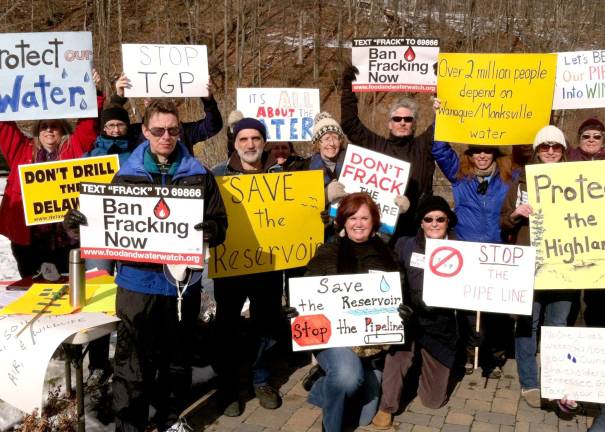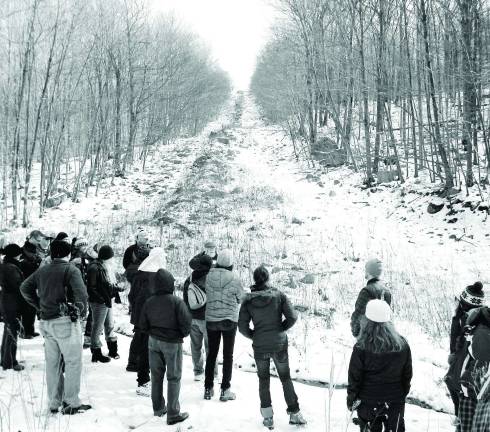Protest group: Pipeline risks too much


WEST MILFORD — Members of the New Jersey Highlands Coalition, along with members of the Sierra Club, Food and Water Watch and Franciscan Response to Fracking, gathered together at the end of East Shore Road along Greenwood Lake Turnpike for the peaceful “Stop The Tennessee Gas Pipeline” rally held last Saturday morning.
The rally was in protest of the Tennessee Gas Pipeline that is scheduled to begin construction later this month. The pipeline will stretch 40 miles from Milford, Pa., across the Delaware River into Northern New Jersey. One of the areas the pipeline is planned to cut through is the critically sensitive body of water, the Monksville Reservoir, which currently provides clean drinking water to millions of New Jersey families.
“We are committed to protecting the Highlands,” said Erica Van Auken, the campaign and grassroots coordinator for the New Jersey Highlands Coalition. “We need more public leaders to join us in the fight to protect our land. We will not rest until this pipeline project is stopped and the resources of the Highlands are protected. We expect the same caution from our elected leaders, which is why we are rallying today-to put an end to bad pipeline projects.”
Carl Richko, former West Milford mayor and Highlands Council member, agreed.
“The New Jersey Highlands region supplies two thirds of the state’s water supply,” said Richko. “The Tennessee Pipeline runs through some of the most sensitive areas of this region. The state of New Jersey should be doing everything possible to protect the water supply of the most densely populated state in the US.”
In a press release, West Milford Mayor Bettina Bieri stated, “West Milford officials have expressed concerns about this project all along, but federal approvals to proceed were already granted before it was brought to our attention. We now urge stakeholders to withhold any further approvals for expansion of the pipeline until each community that has already been affected by the pipeline project is fully restored. Such restoration includes that all disturbed lands are stabilized, all roads are repaired, all bodies of water are cleaned, and runoff is dredged at NO cost to the affected communities. Such restoration does not even begin to address the potential long term damages.”
Matt Smith of Wanaque is an organizer with Food and Water Watch. He felt it was important to come out Saturday to make people aware of the dangers of the pipeline to the water supply and the environment in general, as well as the effects fossil fuels have on weather conditions.
“If built, the pipeline would carry fracked gas from the Marcellus shale area of Pennsylvania. It’ll cross the Delaware River, it will cross the Monksville Reservoir. These are critical water bodies providing clean water to millions of families in New Jersey,” said Smith. “The pipeline itself would impact five counties in New Jersey, would clearcut over 800 acres of pristine parkland and hardwood forests. It would have impacts on critically sensitive eco-systems in the New Jersey Highlands Region, and also it’s doubling down on fossil fuel infrastructure.
“The idea that we’re going to continue building infrastructure to support a growing fossil fuel industry is backwards,” Smith added. “We need to be moving in the other direction. We need to be developing clean, renewable energy sources that don’t threaten our air, our water and our climate.”
The Tennessee Gas Pipeline Northeast Upgrade proposes to add pipeline to transport natural gas mined from the Marcellus shale region in Pennsylvania using hydraulic fracturing, or fracking. The gas would be transported through Pennsylvania, into New Jersey and disbursed to markets in New York, Maryland and the Gulf Coast. The upgrade runs from Ringwood, under the Monksville Reservoir, through West Milford to Mahwah and is estimated to cost about $400 million.
What do you think about the pipeline upgrade? Go to westmilfordmessenger.com and tell us.